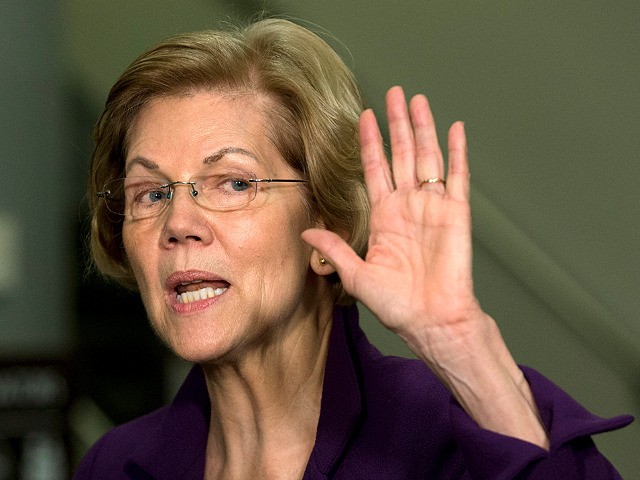Sen. Elizabeth Warren (D-MA) said the Senate “must honor” Justice Ruth Bader Ginsburg’s wish to be replaced after a new president is elected, despite demanding the Senate to “do its job” by holding confirmation hearings and voting on former President Barack Obama’s nominee, Merrick Garland, in 2016.
“With voting already underway for the 2020 elections, Ruthie’s ‘most fervent wish’ was for her replacement not to be named ‘until a new president is installed.’ We must honor her wish,” Warren said in a statement on Friday:
With voting already underway for the 2020 elections, Ruthie’s “most fervent wish” was for her replacement not to be named “until a new president is installed.” We must honor her wish.
— Elizabeth Warren (@SenWarren) September 19, 2020
On Monday, Warren previewed the upcoming SCOTUS battle, warning that the fight “has only just begun”:
Mitch McConnell and Republicans think this fight is over. But let me be clear: This fight has only just begun—and we’re ready to give it all we’ve got. https://t.co/nhezq9iKfd
— Elizabeth Warren (@ewarren) September 21, 2020
The former Democrat presidential hopeful’s remarks stand in sharp contrast to the position that she, like many of her Democrat allies, held in 2016 after then-President Obama nominated Merrick Garland to replace Justice Antonin Scalia, who died months before the November showdown between then-candidate Donald Trump and Hillary Clinton.
“.@POTUS has done his job selecting a nominee & sending that nominee to the Senate. It’s time for the Senate to do its job,” Warren declared in March 2016:
.@POTUS has done his job selecting a nominee & sending that nominee to the Senate. It’s time for the Senate to do its job. #SCOTUSnominee
— Elizabeth Warren (@SenWarren) March 16, 2016
I look forward to meeting with Judge Garland, reviewing his record closely, coming to a decision & then voting. #SCOTUSnominee
— Elizabeth Warren (@SenWarren) March 16, 2016
It’s my hope all Senators will show that they respect the President, the Constitution, & Judge Garland enough to do the same. #SCOTUSnominee
— Elizabeth Warren (@SenWarren) March 16, 2016
At the time, Senate Majority Leader Mitch McConnell (R-KY) based his decision — to refrain from considering Obama’s nominee — on the “Biden Rule,” which Democrats now say McConnell misrepresented.
The “Biden Rule” stemmed from a 1992 floor speech delivered by the former vice president, who was chairman of the Judiciary Committee at the time. He said in part:
Should a justice resign this summer and the president move to name a successor, actions that will occur just days before the Democratic Presidential Convention and weeks before the Republican Convention meets, a process that is already in doubt in the minds of many will become distrusted by all. Senate consideration of a nominee under these circumstances is not fair to the president, to the nominee, or to the Senate itself.
Mr. President, where the nation should be treated to a consideration of constitutional philosophy, all it will get in such circumstances is a partisan bickering and political posturing from both parties and from both ends of Pennsylvania Avenue. As a result, it is my view that if a Supreme Court Justice resigns tomorrow, or within the next several weeks, or resigns at the end of the summer, President Bush should consider following the practice of a majority of his predecessors and not — and not — name a nominee until after the November election is completed.
In 2016, Biden seemingly abandoned his previous position, urging the Senate to give Garland a vote.
“Give Merrick Garland a vote. Look, folks, you don’t have to — my friends in the Senate, they don’t have to support Merrick Garland,” Biden said. “You don’t have to support the chief judge of the [D.C.] Circuit. Vote no, but give him a vote.”
At the time, Biden warned that lawmakers were “setting an incredibly dangerous precedent.
“I’m prouder of being in the Senate over that time than anything I’ve done in my whole life, but don’t — don’t set this dangerous precedent,” he added.
However, in recent days, Biden has once again reversed course, unequivocally stating that, in the current case, the Senate “should not act until the American people select their next president.”
Republicans have been able to seize Biden’s fluctuating positions to justify their handling of the 2016 SCOTUS battle, as well as the upcoming fight.
“In other words, the so-called ‘Biden Rule’ cuts both ways: The GOP can use it to justify both actions, and there is enough difference between the two situations that Republicans have the energy they need to move forward now,” as Breitbart News reported.
Some GOP leaders, such as Sen. Ted Cruz (R-TX), contend that 2016 was different in that the Senate and presidency lacked party unity. Additionally, Obama was an outgoing president, meaning there was no chance of America reelecting the man choosing the SCOTUS nominee, although a win for Clinton would have, likely, been viewed as confirmation for Obama.
“Twenty-nine times there has been a vacancy in a presidential election year. Now, presidents have made nominations all 29 times,” Cruz explained during a Sunday appearance on ABC’s This Week, defending the president’s forthcoming action.
McConnell, speaking from the Senate floor on Monday, defended his vow to proceed with the process ahead of the election, citing 1888 as the last time an election-year Supreme Court vacancy was approved by a divided government.
“As of then, only six prior times in American history had a Supreme Court vacancy arisen in a presidential election year and the president sent a nomination that year to the Senate of the opposite party,” McConnell said.
“The majority of those times the outcome was exactly what happened in 2016. No confirmation,” he added.

COMMENTS
Please let us know if you're having issues with commenting.